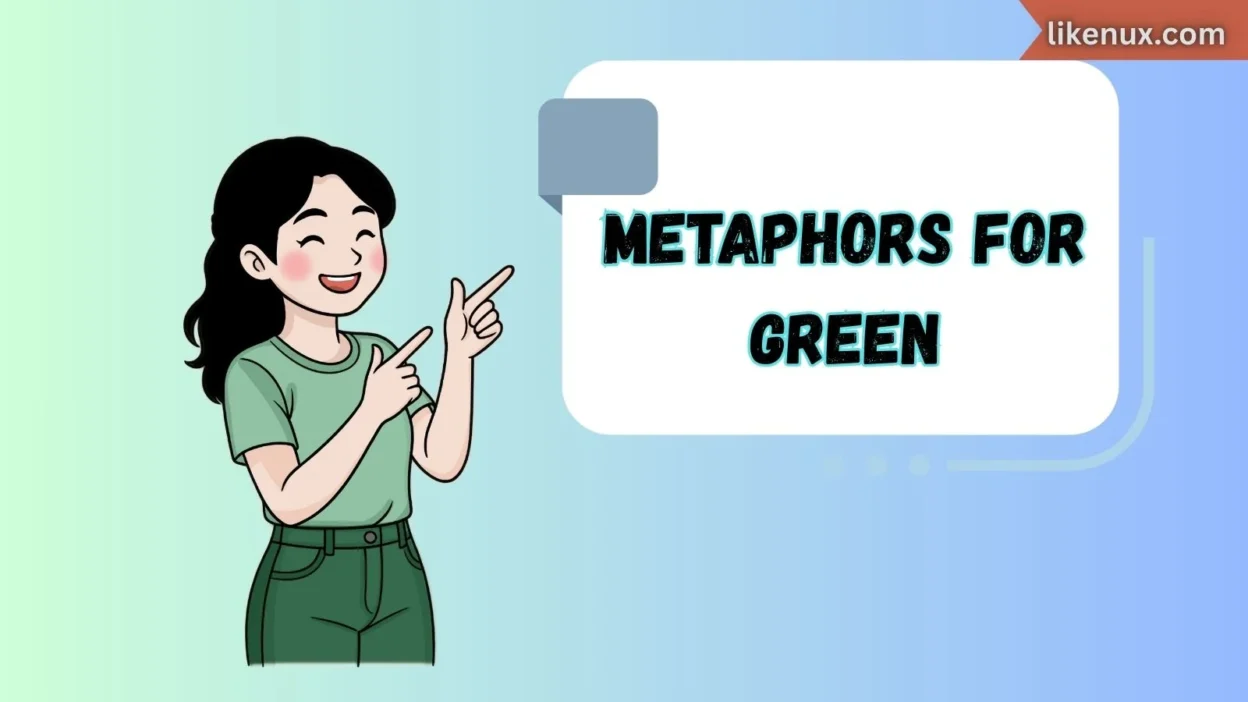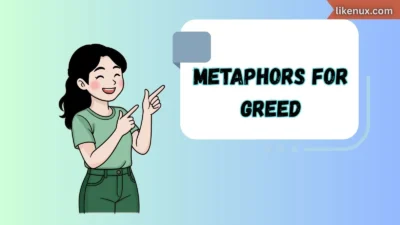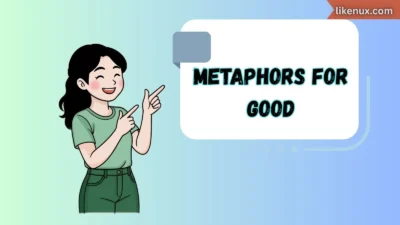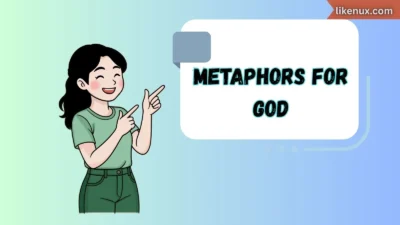Green is more than just a colour—it is a symbol of life, freshness, hope, and renewal. For centuries, writers, poets, and everyday people have used “green” as a metaphor to express growth, healing, youth, and even inexperience. Whether you’re a student writing creatively, a professional looking for thoughtful phrasing, or simply someone who loves the beauty of words, exploring different ways to use “green” can help you communicate with depth and care. Metaphors for Green.
From my own experience as a writer, I’ve often found that green metaphors breathe life into everyday conversations. They allow us to connect with nature, emotions, and even new beginnings in ways that plain words cannot. Below, I’ve shared 25 warm and meaningful metaphors for green, explained with examples, uses, and alternatives so you can apply them in your own writing.
1. Green as Growth
Meaning: Symbol of development and progress.
Sentence: “Her ideas are still green, but they’re growing stronger every day.”
Best Use: When describing someone’s personal journey or creative process.
Other Ways to Say: Flourishing, evolving, budding.
2. Green as Renewal
Meaning: Represents a fresh start or healing.
Sentence: “Spring is the earth’s way of turning green again.”
Best Use: To illustrate recovery, transformation, or second chances.
Other Ways to Say: Rebirth, restoration, revival.
3. Green as Youth
Meaning: A metaphor for inexperience or innocence.
Sentence: “He’s still green in the business world.”
Best Use: To describe beginners or learners in any field.
Other Ways to Say: Fresh, new, unseasoned.
4. Green as Nature’s Language
Meaning: Reflects harmony with the environment.
Sentence: “The mountains were painted in endless shades of green.”
Best Use: To describe landscapes, peace, or eco-friendly living.
Other Ways to Say: Verdant, natural, earthy.
5. Green as Hope
Meaning: A sign of optimism and possibility.
Sentence: “In her eyes was the green of unshaken hope.”
Best Use: When uplifting or motivating someone.
Other Ways to Say: Bright future, promise, faith.
6. Green as Healing
Meaning: Associated with recovery and balance.
Sentence: “The green forest felt like a medicine for the soul.”
Best Use: To symbolize emotional or physical healing.
Other Ways to Say: Restorative, soothing, calming.
7. Green as Fertility
Meaning: Linked to abundance and creation.
Sentence: “The green fields promised a bountiful harvest.”
Best Use: Talking about agriculture, creativity, or family life.
Other Ways to Say: Fruitful, productive, abundant.
8. Green as New Beginnings
Meaning: A metaphor for starting fresh.
Sentence: “Every sunrise brings green possibilities.”
Best Use: In life transitions, career changes, or personal growth.
Other Ways to Say: Fresh start, dawn, renewal.
9. Green as Energy
Meaning: Symbolizes vitality and life force.
Sentence: “Children run with the unstoppable green of youth.”
Best Use: Expressing vibrancy and enthusiasm.
Other Ways to Say: Lively, spirited, vigorous.
10. Green as Envy
Meaning: A classic metaphor for jealousy.
Sentence: “She turned green with envy when she saw the award.”
Best Use: When describing human emotions.
Other Ways to Say: Jealous, resentful, covetous.
11. Green as Balance
Meaning: Represents harmony and stability.
Sentence: “Meditation brought a green calm to his restless mind.”
Best Use: To describe peace or inner clarity.
Other Ways to Say: Harmony, centeredness, tranquility.
12. Green as Innocence
Meaning: Associated with purity and childlike wonder.
Sentence: “Her green laughter filled the room.”
Best Use: To describe someone untouched by cynicism.
Other Ways to Say: Pure, naïve, unspoiled.
13. Green as Freedom
Meaning: Linked to open fields and wide possibilities.
Sentence: “He felt green freedom on the open road.”
Best Use: When writing about travel or liberation.
Other Ways to Say: Boundless, limitless, open.
14. Green as Creativity
Meaning: Growth of fresh and original ideas.
Sentence: “Her green imagination painted worlds unseen.”
Best Use: Talking about art, innovation, or problem-solving.
Other Ways to Say: Inventive, fresh, inspired.
15. Green as Wealth
Meaning: A metaphor tied to money.
Sentence: “He worked hard to earn his green fortune.”
Best Use: Discussing finances or prosperity.
Other Ways to Say: Cash, riches, abundance.
16. Green as Renewal of Spirit
Meaning: Emotional or spiritual awakening.
Sentence: “Prayer gave him a green heart.”
Best Use: In spiritual or reflective contexts.
Other Ways to Say: Awakened, refreshed, restored.
17. Green as Adventure
Meaning: Stepping into new, unexplored areas.
Sentence: “They walked into the green unknown.”
Best Use: For travel writing or storytelling.
Other Ways to Say: Exploration, discovery, journey.
18. Green as Safety
Meaning: Universal symbol of permission or security.
Sentence: “The green light urged her forward.”
Best Use: In contexts of progress, approval, or reassurance.
Other Ways to Say: Go ahead, clearance, signal.
19. Green as Patience
Meaning: Growth that takes time.
Sentence: “Like a green seed, success waits to bloom.”
Best Use: Motivational or reflective writing.
Other Ways to Say: Waiting, nurturing, gradual.
20. Green as Dreams
Meaning: Symbol of hope-filled imagination.
Sentence: “He lived in the green glow of his dreams.”
Best Use: Creative, poetic expressions.
Other Ways to Say: Aspirations, visions, hopes.
21. Green as Connection
Meaning: Bond with life and others.
Sentence: “The picnic felt wrapped in green togetherness.”
Best Use: Writing about relationships or community.
Other Ways to Say: Unity, belonging, closeness.
22. Green as Resilience
Meaning: Nature’s power to recover.
Sentence: “The forest turned green again after the fire.”
Best Use: To describe strength after hardship.
Other Ways to Say: Endurance, toughness, recovery.
23. Green as Curiosity
Meaning: Inexperience mixed with eagerness to learn.
Sentence: “Her green eyes asked endless questions.”
Best Use: Talking about learners or explorers.
Other Ways to Say: Wonder, eagerness, questioning.
24. Green as Calmness
Meaning: A soothing and restful presence.
Sentence: “His words carried a green calm.”
Best Use: To describe peaceful emotions or spaces.
Other Ways to Say: Serenity, relaxation, ease.
25. Green as Legacy
Meaning: Growth passed on to the future.
Sentence: “Planting trees is leaving a green gift for tomorrow.”
Best Use: Environmental or inspirational writing.
Other Ways to Say: Heritage, contribution, gift.
FAQs about Metaphors for Green
1. Why is green often linked to growth and life?
Because green is the color of plants, leaves, and nature—it naturally symbolizes vitality and development.
2. Can “green” be both positive and negative?
Yes, green can mean positive things like hope and renewal, but also negative ones like envy or inexperience.
3. How do writers use green in literature?
Authors often use green to describe emotions, seasons, new beginnings, or even jealousy.
4. Are there cultural differences in how green is viewed?
Absolutely. In some cultures, green represents prosperity and luck, while in others it symbolizes youth or spirituality.
5. How can I use green metaphors in daily conversation?
You can describe someone as “green” to mean new at something, or say “green light” to show approval—metaphors make conversations more vivid.
Conclusion
Using metaphors for green allows us to write and speak with warmth, clarity, and creativity. Whether you want to describe growth, hope, healing, or even envy, these metaphors help express feelings in a way that’s both relatable and poetic. Personally, I’ve always felt that the “green of nature” mirrors our own life journeys—always growing, sometimes fragile, but full of promise.
So the next time you write, remember: green is not just a color—it’s a language of life itself.

Andrew Christopher is a passionate visionary who blends creativity with purpose to bring ideas to life. With a focus on innovation and integrity, he inspires growth and lasting impact.



